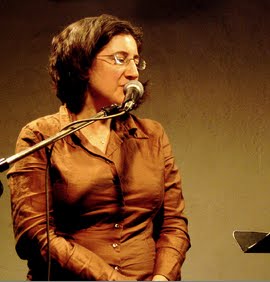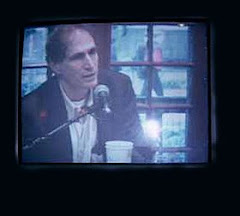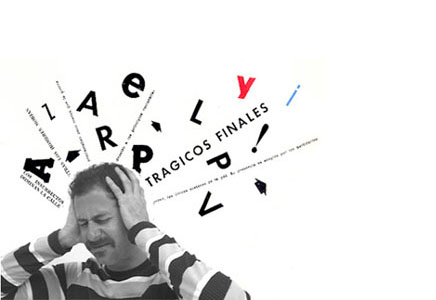 Joined this time by Rachel Blau DuPlessis, the PoemTalkers wasted no time grappling with George Oppen's grappling with the real. The rock of the island he's visiting - its locatedness to be cherished - "outlived the classicists." Is this anti-academic? Yes, we agreed. On an island in Maine, he meets a lobsterman and his wife and finds them super-articulate and at the same time admirably, wonderfully halting in their speech (like Oppen himself here). Oppen: "Difficult to know what one means." The lobsterman's wife: "I don't know how to say." We are all in this real together. Jessica was just back from Vegas, Linh from Iceland, Rachel from teaching a class on the other side of town. Which instruments - archaic and etymologically historical or local, broken-toothed and ready-at-hand - are the tools that will help us understand where exactly we are? "Geo-positioning" seemed to be the word of the day.
Joined this time by Rachel Blau DuPlessis, the PoemTalkers wasted no time grappling with George Oppen's grappling with the real. The rock of the island he's visiting - its locatedness to be cherished - "outlived the classicists." Is this anti-academic? Yes, we agreed. On an island in Maine, he meets a lobsterman and his wife and finds them super-articulate and at the same time admirably, wonderfully halting in their speech (like Oppen himself here). Oppen: "Difficult to know what one means." The lobsterman's wife: "I don't know how to say." We are all in this real together. Jessica was just back from Vegas, Linh from Iceland, Rachel from teaching a class on the other side of town. Which instruments - archaic and etymologically historical or local, broken-toothed and ready-at-hand - are the tools that will help us understand where exactly we are? "Geo-positioning" seemed to be the word of the day. Ballad
Astrolabes and lexicons
Once in the great houses—
A poor lobsterman
Met by chance
On Swan's Island
Where he was born
We saw the old farmhouse
Propped and leaning on its hilltop
On that island
Where the ferry runs
A poor lobsterman
His teeth were bad
He drove us over that island
In an old car
A well-spoken man
Hardly real
As he knew in those rough fields
Lobster pots and their gear
Smelling of salt
The rocks outlived the classicists,
The rocks and the lobstermen's huts
And the sights of the island
The ledges in the rough sea seen from the road
And the harbor
And the post office
Difficult to know what one means
—to be serious and to know what one means—
An island
Has a public quality
His wife in the front seat
In a soft dress
Such as poor women wear
She took it that we came—
I don't know how to say, she said—
Not for anything we did, she said,
Mildly, 'from God'. She said
What I like more than anything
Is to visit other islands...
Linh Dinh blogged about our Oppen session the evening after we recorded #3, so why shouldn't Linh take it from here?
Rachel is a great Oppen scholar, knew him for twenty years, edited his collected letters, so of course she made many sharp points, which I won't misquote here, but being gaseous, as usual, I observed that there is an alluring tension between the poem's stately, majestic tone and its choppy, fumbling syntax. I hazarded that Oppen's probing, drifting language, free of embellishments, reflects a tentative, doubting relationship to the real. There is a tourist logic working here. ((What the fuck am I talking about?)) My mind is still in Iceland, I fear, not the Swan's Island, Maine, of the Oppen poem.
Island, insular, isolated, all derived from the Latin insula. Hawaiian-raised Zach Linmark told me that, as a teenager, he couldn't wait to get out of Oahu. And yet, after bouncing around the U.S. mainland, England, his native Philippines and even Japan, he's back on his lava spill for at least a portion of each year. Ólöf Arnalds, "Iceland's acid folk angel," and I've heard her sing, and she's very good, told me that many of her compatriots also want to get out. Of the younger generations, almost everyone has travelled overseas. Those who haven't are either very weird or very poor. Many Icelanders have settled abroad, but most would return home to live. It's very odd, she thought. Ólöf herself has spent a year in Berlin.
We were riding back to Reykjavik after the farewell dinner for the Nýhil's Poetry Festival. The organizers had hired a bus to take everyone to a fine lobster feast in the village of Stokkseyri. Our conversation turned to the hegemony of English. English syntax is creeping into Icelandic, Ólöf informed me, "Sometimes I hear things said in Icelandic that appear to have been constructed in English."
"That's incredible! You mean Icelanders are thinking in English while speaking Icelandic?"
"Yes, sometimes. Many Icelanders are so proud that we have come up with new words for "computer" and "software," for example, but they don't realize that English is creeping into our syntax. Icelandic grammar is very different from English. The language itself is very compact, whereas English is stretched out."
Suddenly we were engulfed by a funny, rotten egg smell, similar to the tap water funk back in my bathroom. "It's the sulfur in the hot springs," Ólöf laughed. It came from outside, in the darkened landscape. "I didn't want you to think it was me!"
PoemTalk #3 was recorded in the Arts Cafe of the Kelly Writers House, that 1851 Tudor-style cottage on Locust Walk in Philadelphia which was taken over in 1995 by a gang of learning-community-starved writers. The show was produced by Al Filreis and Mark Lindsay, directed and edited by Steve McLaughlin. Oppen's "Ballad" was recorded in 1979 in Brooklyn, by Verna Gillis and Michael Heller. Visit Oppen's PennSound page.


























2 comments:
I love that the poem is a portrait of humanity, being born, working, living and dying somewhere, recognizing it as a part of your being, your mortality in the shadow of where you are and what you leave behind, or create, the people who come and go, the separateness of rich and poor, the origins in something greater, perhaps God, or something indescribable, unexplainable...
Most of all: To visit other islands, to experience yourself somewhere else, not to escape from as much as escape back into what being alive means, to see the sameness and difference as one.
what a great programme!
Post a Comment